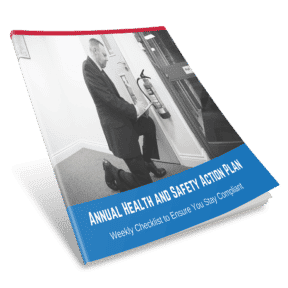The Legal Requirements For Manual Handling In The Workplace
Manual handling in the workplace is something most people are familiar with. From shop jobs as a teenager to management roles later in life, pretty much all workplaces do manual handling training.
Why? Because it’s a legal requirement.
In this blog, we explore why this is such a vital aspect of health and safety training.

What Is Manual Handling?
Manual handling in the workplace can refer to a variety of tasks. From lifting objects to moving items from one place to another or simply carrying something around, manual handling describes any transportation or supporting of objects, people or animals using one’s body.
The day-to-day running of many businesses involves some aspect of manual handling. Examples of manual handling in the workplace include:
- Lifting boxes
- Packaging products
- Handling animals
- Carrying trays of heavy crockery
- Operating machinery
- Moving heavy goods from one place to another
- Pushing or pulling trolleys
- Lifting, handling or moving patients

Manual Handling And UK Legislation
All employers have a legal duty to protect their workers from the risks that manual handling activities pose.
According to the Health and Safety Executive, improper manual handling in the workplace has been found to be the cause of approximately 20% of workplace injuries in the UK. Injuries caused by manual handling include musculoskeletal injuries, or MSIs, fractures, sprains and strains.
And it’s not just about keeping your people safe at work. With MSIs being the third most common cause of absence and lost working time, reducing their occurrence should be high on any business’s agenda.
Two main pieces of legislation are in place to ensure employers look after workers who perform manual handling tasks…
- The Health and Safety at Work etc. Act 1974 is the primary piece of legislation covering occupational health and safety in Great Britain.
- The Manual Handling Operations Regulations 1992 requires employers to assess their business operations and avoid or reduce any risks of injury from manual handling.
Both pieces of legislation apply to almost all work environments, from hospitals to warehouses. Employers are required specifically by the Manual Handling Operations Regulations 1992 to ensure that all employees are trained and competent in manual handling. To remain compliant, employers must assess and reduce the risks in their workplace and provide appropriate equipment that keeps workers safe from injury and incidents.
Manual Handling Training
To keep their people safe and healthy, employers must train workers in good manual handling practices through a certified body. Manual handling training courses are very simple to bring into any workplace setting.
Taking up only half a day, training your people in good manual handling in the workplace can be done either in person in a group setting or virtually as an e-learning programme. Accessing the course is therefore flexible and adaptable to individual needs and can be completed even from the comfort of your sofa!
What Does Manual Handling Training Cover?
Training courses cover several aspects of manual handling in the workplace, such as:
- Manual handling injuries
- Legislation
- Employer and employee responsibilities
- Terminology and definitions
- Manual handling risk assessment
- Hazards, risks and control measures
- Hierarchy of control measures
- Safe manual handling principles
- Manual handling equipment
Who’s It For?
Manual handling training works best when delivered to everyone because it ensures high safety levels throughout a workplace and promotes and health and safety-centroc culture.
Training content does need to be relevant to the type of work being carried out to be most effective. Hospital staff will be carrying out very different manual handling activities compared to individuals working in a factory setting, for example, and as such need to be trained to manage the appropriate hazards.
How Often Is Manual Handling Training Required?
It is recommended that refresher training is untaken at least every three years to refresh everyone’s memory and reduce the risk of workplace injuries.
What Happens If We Don’t Provide Manual Handling Training?
The cost of not training your staff in good manual handling can be high.
Without manual handling training…
People Get Hurt
Workers without knowledge and understanding of manual handling risks are far more likely to experience injury and incidents that could leave them with long-lasting conditions.
Legal Ramifications
Fines and compensation payments for incidents relating to manual handling have historically reached over £100,000 – and there is no cap on the potential fine for a serious breach. Even a minor breach can see you charged £20,000 for neglecting to look after your people properly.
Bad Reputation
Would YOU want to work for an employer that didn’t take your health and safety seriously?
Didn’t think so. Gathering respect and trust as a brand and bringing experienced, skilled employees on board will be a hard task for employers who aren’t willing to protect their people.
Manual Handling Training Is A Legal Requirement
Effective manual handling training is required by anyone responsible for moving goods in a workplace, but it’s good practice for all employees.
Employers failing to provide manual handling training for their staff put them at risk of short-term and long-term injury, lose crucial working time and leave their business open to hefty fines due to non-compliance.
Wondering where to find a Manual Handling training course but worried about exceeding your training budget? Look no further. Check out our offering here and take the stress out of manual handling health and safety in the workplace.
Find this helpful?
Signup to our email notifications to receive alerts when we publish new blogs. We promise not to spam your inbox, you will just get a short snappy intro to Health and Safety articles we think you will love.
"*" indicates required fields

Annual Health and Safety Action Plan
If you’ve got a question or query, please contact our super friendly team, they will be delighted to help you!
Simply get in touch via phone or email.

Free
Resources &
Downloads
Informative. Useful. Practical.
Here at Envesca we believe that we are good at giving proactive, sensible and useful advice. Below you will find some free resources that you can download on a host of subjects that will help you and your business.
Training Available
Envesca offer a number of different training courses, which offer advice and guidance on these topics.





